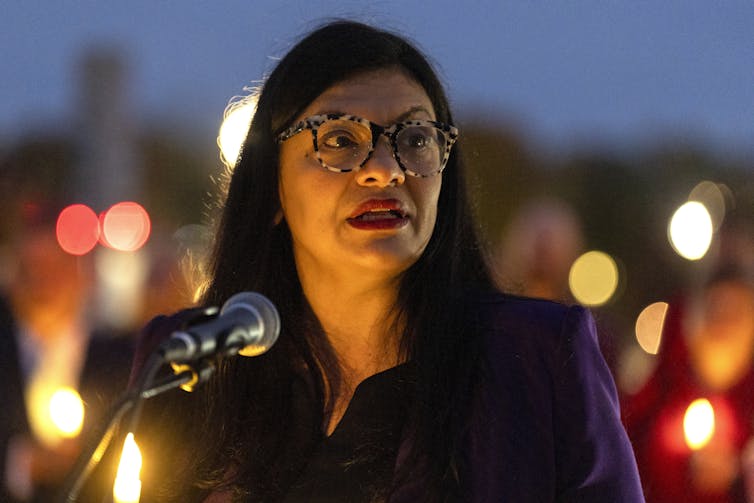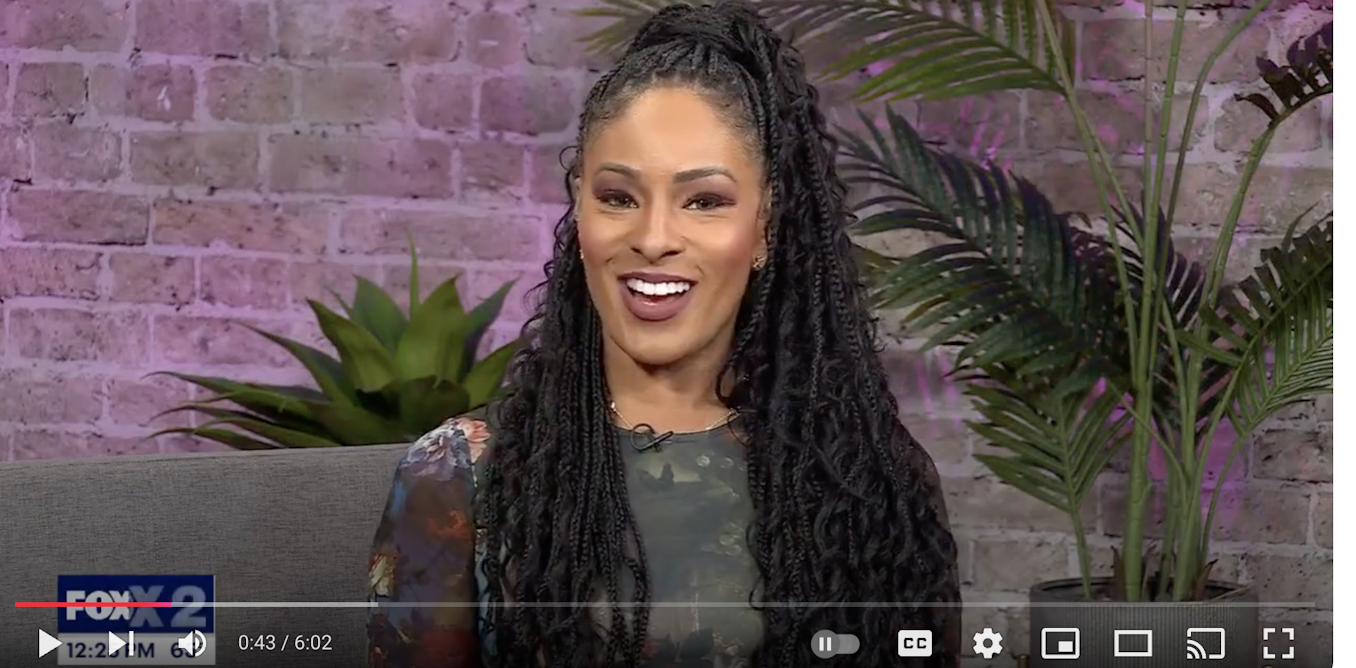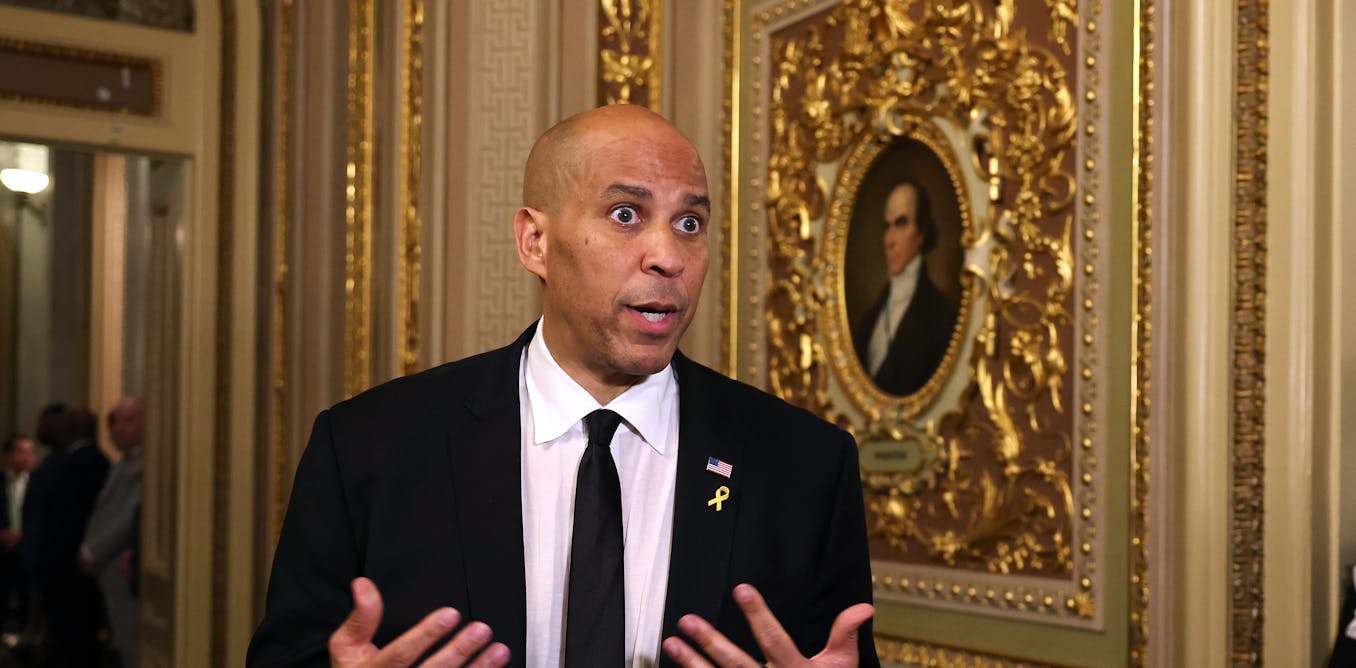In 2024, Gallup reported Americans’ trust in media was at an all-time low.
In 1972, only about 6% of Americans said they had no trust at all in mass media. Between 2020 and 2024, that number teetered between 33% and 39%.
The issue is worse in the United States than in 46 other countries. The decline has made headlines over and over again.
I’ve spent the past 10 years studying problems with journalism that help explain this decline.
I can tell you that audiences notice when reporters get things wrong or fall short of their expectations. For Black communities, traditional news outlets routinely fall into problematic narratives that too often portray Black people in compromising, inaccurate or inadequate ways. Throughout its history, journalism has struggled to get it right.
Declines in trust may help explain the small but growing number of people who actively avoid the news – as well as those who are turning to new sources of information.
I recently set out to find out who these new sources were. My research focused on Black communities in the Midwest, including Michigan.
Trusted messengers of news
Increasingly, researchers find people rely on liaisons for their information needs.
One type of liaison is news influencers, individuals who regularly post about newsworthy events and have large social followings. In a recent study, Pew looked at influencers with more than 100,000 followers. They found X (formerly Twitter) attracts the most news influencers, but they exist on most social sites.
Pew’s findings show that these social media news influencers are more likely to be male than female – 63% compared with 30%. Just 52% expressed a political orientation in their bios and posts. Of those, 27% were right-leaning and 21% left-leaning. Only on TikTok were left-leaning influencers in the majority.
More to influencing than social media
But as my research has routinely found, there’s more to news liaisons than influencers on social media. I surveyed Black communities in states such as Michigan, Minnesota and Wisconsin to catalog the news and information sources they relied on. In Minnesota, I followed up by interviewing the liaisons themselves.
I’ve learned that people often see members of their own communities as the most reliable and trusted sources of information. Based on my survey and interview data, these “trusted messengers” of essential information share a few common traits.
Paul Sancya/AP Photo
Visibility: Trusted messengers are highly visible in their communities. Sometimes this means they have large followings on television, websites, podcasts or social media. However, some don’t use social media as their principal space for connecting with others.
Instead, their followings exist in other spaces where they are regularly visible, such as in-person community meetings, sporting events or Sunday service. Trusted messengers of news and critical information can be found on and off social media, and the type of news they provide varies by situation.
Consistency: Trusted messengers consistently engage with members of their communities. They tend to earn trust through equal parts longevity and predictability of their behavior. Many trusted messengers have been residents in their communities for extended periods of time.
Consistency is part of their communication practices. You can expect them to speak out about certain issues that challenge a community. In Minnesota, for example, key activists such as Marcia Howard and Medic Kim consistently reported on essential news updates that especially affected those grieving, organizing and protesting near 38th and Chicago where George Floyd was murdered.
Stance-takers: Trusted messengers of news aren’t typically beholden to norms of objectivity and are willing to take stances on issues that are critical for them and their communities. Some take more temperate stances, while others may align with more radical approaches. Whatever the case, individuals who take stances are more likely to gain a trusted following.
Journalists: Across states and communities, those trained to provide news and information are often individuals who are trusted the most to provide it. For Black communities, Black journalists most often ranked as the most trusted individuals.
Michigan’s trusted messengers
In October 2024, a research team I lead released our most recent report detailing the media and news preferences of Black Michiganders.
Our team of researchers surveyed 380 Black Michiganders in 2023 and asked them about their biggest concerns, news consumption habits and the places they trust the most to find news and information.
We found the trusted messengers in Michigan were unique in many ways.
More state-level politicians, such as U.S. Rep. Rashida Tlaib and Gov. Gretchen Whitmer, were named as trusted messengers than in any other state we had previously surveyed.
Several of those named in the survey were both activists and faith leaders, including national leaders such as Rev. Al Sharpton and local activists such as Rev. Malik Shabazz. Many trusted messengers, such as the journalist and Detroit native Phil Lewis, rely heavily on social media to regularly discuss important news and information, but others have significantly smaller followings and utilize other forms of visibility.

AP Photo/Jacquelyn Martin
Black Michiganders singled out some Black journalists like FOX 2 anchor Maurielle Lue as trusted messengers. In addition to her prominent positions on air, Lue has garnered significant attention through her social channels, where she provides more personal perspectives on her everyday life, such as her struggle with COVID.
Newspaper journalists, such as longtime Detroiter Darren Nichols, were also named. Nichols’ visibility on social media is more tempered than some of his counterparts, but his commitment to the city where he has reported for most of his career has secured his consistent visibility and trusted status in other ways.
Some trusted journalists worked for Black-led news organizations such as Outlier. But some held affiliations with mainstream news organizations that audiences had some doubts about. Our research finds that in cities around the Midwest, Black journalists can play critical roles as trusted liaisons between their employers and Black communities.
Challenges with trusted messengers
There are challenges with relying on trusted messengers.
The type and quality of information provided by trusted messengers can vary drastically. In our interviews in Minnesota, we found some trusted messengers prioritized certain kinds of information, such as health-related subjects or city politics. Fewer felt compelled to discuss a variety of news.
Trusted messengers’ news sources varied. Some were avid news readers and sought information from primary sources. Others repeated information they had gotten from less traditional sources.
One trusted messenger we asked about where she got information about which hospitals or doctors provided the worst care said a principal stop was community elders. Another trusted messenger said he received COVID vaccine information from various groups on social media. These critical knowledge bases can be helpful in some circumstances, but they can also get the facts wrong.
Influencing in the future
As I see it, those who aspire to be trusted messengers would likely benefit from understanding the intermediary role they play in informing citizens.
In our reports, we recommend several evidence-based paths forward for trusted messengers from various backgrounds. These include prioritizing journalistic practices of researching information from credible sources and verifying information. It’s also important to show up – often – in community with others to build trusting relationships.
We recommend that traditional newsrooms make more space for journalists to be visible in communities and talk to community members, online and in person. We believe that community-embedded trusted messengers who aren’t journalists should also consider the essential role they could play as sources of information and knowledge sharers.
We urge trusted messengers who are interested in bolstering the quality of news and information about and in their community to connect with local journalists directly. Their expertise could help journalists more effectively report on the issues that matter to their communities.
And journalists should pay attention to changes in whom people trust. If trust in news continues to remain low, as it has for the past few decades, understanding the role news influencers and trusted messengers play is critical for understanding how people are informed.




